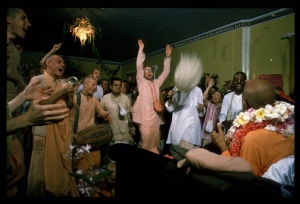CC Madhya 14.18 (1975): Difference between revisions
(Vanibot #0027: CCMirror - Mirror CC's 1996 edition to form a basis for 1975) |
(Vanibot #0020: VersionCompareLinker - added a link to the Version Compare feature) |
||
| Line 2: | Line 2: | ||
<div style="float:left">'''[[Sri Caitanya-caritamrta (1975)|Śrī Caitanya-caritāmṛta (1975)]] - [[CC Madhya (1975)|Madhya-līlā]] - [[CC Madhya 14 (1975)|Chapter 14: Performance of the Vṛndāvana Pastimes]]'''</div> | <div style="float:left">'''[[Sri Caitanya-caritamrta (1975)|Śrī Caitanya-caritāmṛta (1975)]] - [[CC Madhya (1975)|Madhya-līlā]] - [[CC Madhya 14 (1975)|Chapter 14: Performance of the Vṛndāvana Pastimes]]'''</div> | ||
<div style="float:right">[[File:Go-previous.png|link=CC Madhya 14.17 (1975)|Madhya-līlā 14.17]] '''[[CC Madhya 14.17 (1975)|Madhya-līlā 14.17]] - [[CC Madhya 14.19 (1975)|Madhya-līlā 14.19]]''' [[File:Go-next.png|link=CC Madhya 14.19 (1975)|Madhya-līlā 14.19]]</div> | <div style="float:right">[[File:Go-previous.png|link=CC Madhya 14.17 (1975)|Madhya-līlā 14.17]] '''[[CC Madhya 14.17 (1975)|Madhya-līlā 14.17]] - [[CC Madhya 14.19 (1975)|Madhya-līlā 14.19]]''' [[File:Go-next.png|link=CC Madhya 14.19 (1975)|Madhya-līlā 14.19]]</div> | ||
{{CompareVersions|CC|Madhya 14.18|CC 1975|CC 1996}} | |||
{{RandomImage}} | {{RandomImage}} | ||
==== TEXT 18 ==== | ==== TEXT 18 ==== | ||
<div class="verse"> | <div class="verse"> | ||
:rājā kahe, | :rājā kahe,-āmi tomāra dāsera anudāsa | ||
:bhṛtyera bhṛtya kara,-ei mora āśa | :bhṛtyera bhṛtya kara,-ei mora āśa | ||
</div> | </div> | ||
| Line 18: | Line 17: | ||
<div class="synonyms"> | <div class="synonyms"> | ||
rājā kahe—the King said; āmi—I; tomāra—Your; dāsera anudāsa—most obedient servant of Your | rājā kahe—the King said; āmi—I; tomāra—Your; dāsera anudāsa—most obedient servant of Your servant; bhṛtyera bhṛtya—servant of the servant; kara—make (me); ei—this; mora āśa—my desire. | ||
</div> | </div> | ||
| Line 25: | Line 24: | ||
<div class="translation"> | <div class="translation"> | ||
The King replied, | The King replied, "My Lord, I am the most obedient servant of Your servants. It is my ambition that You will accept me as the servant of Your servants." | ||
</div> | </div> | ||
| Line 32: | Line 31: | ||
<div class="purport"> | <div class="purport"> | ||
The greatest achievement for a devotee is to become a servant of the servants | The greatest achievement for a devotee is to become a servant of the servants. Actually no one should desire to become the direct servant of the Lord. That is not a very good idea. When Prahlāda Mahārāja was offered a benediction by Nṛsiṁhadeva, Prahlāda rejected all kinds of material benediction, but he prayed to become the servant of the servant of the Lord. When Dhruva Mahārāja was offered a benediction by Kuvera, the treasurer of the demigods, Dhruva could have asked for unlimited material opulence, but he simply asked for the benediction of becoming the servant of the servants of the Lord. Kholāvecā Śrīdhara was a very poor man, but when Śrī Caitanya Mahāprabhu wanted to give him a benediction, he also prayed to the Lord to be allowed to remain a servant of the servants of the Lord. The conclusion is that being the servant of the servants of the Supreme Personality of Godhead is the highest benediction one can desire. | ||
</div> | </div> | ||
Latest revision as of 08:18, 27 January 2020

A.C. Bhaktivedanta Swami Prabhupada
TEXT 18
- rājā kahe,-āmi tomāra dāsera anudāsa
- bhṛtyera bhṛtya kara,-ei mora āśa
SYNONYMS
rājā kahe—the King said; āmi—I; tomāra—Your; dāsera anudāsa—most obedient servant of Your servant; bhṛtyera bhṛtya—servant of the servant; kara—make (me); ei—this; mora āśa—my desire.
TRANSLATION
The King replied, "My Lord, I am the most obedient servant of Your servants. It is my ambition that You will accept me as the servant of Your servants."
PURPORT
The greatest achievement for a devotee is to become a servant of the servants. Actually no one should desire to become the direct servant of the Lord. That is not a very good idea. When Prahlāda Mahārāja was offered a benediction by Nṛsiṁhadeva, Prahlāda rejected all kinds of material benediction, but he prayed to become the servant of the servant of the Lord. When Dhruva Mahārāja was offered a benediction by Kuvera, the treasurer of the demigods, Dhruva could have asked for unlimited material opulence, but he simply asked for the benediction of becoming the servant of the servants of the Lord. Kholāvecā Śrīdhara was a very poor man, but when Śrī Caitanya Mahāprabhu wanted to give him a benediction, he also prayed to the Lord to be allowed to remain a servant of the servants of the Lord. The conclusion is that being the servant of the servants of the Supreme Personality of Godhead is the highest benediction one can desire.